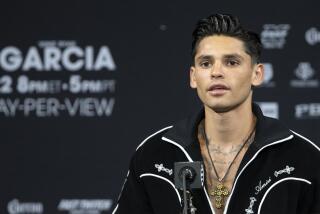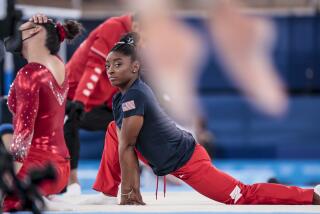Booing Put Biggs Into Depression : Boxer Continues Treatment at CareUnit as Out-Patient
- Share via
For five years, Tyrell Biggs has worn the mantle. A lot of people in boxing saw him make the progression from national amateur boxing champion to Olympic champion. The logical jump seemed to be to world heavyweight champion.
After all, George Foreman and Joe Frazier, the last two Americans who won the Olympic heavyweight title, made that leap.
In Biggs’ case, it seemed to make sense. At 6-5 and 220 pounds, he certainly looks the part. He’s an excellent athlete with well developed skills after years of boxing world-class amateurs. He isn’t a knockout puncher, however, relying instead on movement and a long left jab to set up scoring combinations.
Biggs won the super-heavyweight gold medal at the Olympics last August. When he signed a pro contract after the Games, it earned him a lucrative, multiyear deal with ABC. He was on his way. In a couple of years, there would be big-money heavyweight bouts and, perhaps, a crack at the title.
But all that seemed to be tottering in uncertainty this week, after disclosure that Biggs had recently been discharged from the CareUnit in Orange, where he underwent three weeks of treatment for an alcohol-drug dependency. He will continue treatment there as an out-patient until mid-February.
Biggs, a Philadelphia native, turned pro in New York last Nov. 15 and won a six-round decision over a Los Angeles heavyweight, Mike Evans. Biggs was booed heartily that night by many of the 18,000 at Madison Square Garden. It was a slow, plodding bout on a night when the crowd wanted to see the Olympic super-heavyweight champion flatten his opponent.
The boos began in the second round and never stopped.
Associates of Biggs said this week that the booing Biggs got that night plunged him into depression.
Said his trainer, Lou Duva: “Tyrell is a very sensitive kid who wants to be liked. When that big crowd booed him, it just tore him up. All of us (five other U.S. Olympic medalists made their pro debuts that night.) went out for pizza afterward except Tyrell. He said he was going back to the hotel. I haven’t seen him since, although we’ve talked on the phone.
“We’re going to stand by Tyrell, help him piece things together. We want him back in the mainstream of things. We’re not going to desert him.
“He went from an emotional high to a deep depression in November. He trained harder than any of the kids for his pro debut. In training camp, he was the first guy in the gym and the last to leave. He was excited, really looking forward to boxing in the Garden. He really wanted to look good in his first fight.
“But when they booed like that . . . well, he had a hard time with it.”
Biggs has been asked by doctors at the CareUnit not to grant interviews for at least two weeks.
Shelly Finkel, a New York rock promoter-turned boxing manager who handles Olympic medalists Biggs, Mark Breland, Meldrick Taylor, Pernell Whitaker and Evander Holyfield, agreed with Duva that the booing Nov. 15 had driven Biggs into depression.
“Tyrell isn’t an emotionally strong individual,” he said. “He’s a man in age (24) but a boy. The booing at the Garden really upset him. I knew when I talked to him the next morning we had some serious problems. He told me, ‘I’ve got to get out of here,’ and left.
“He and Mark were supposed to go to Los Angeles to receive awards, but he never showed up there. He went home (to Colorado Springs) instead.”
Finkel indicated that Biggs’ alcohol-drug dependency problem had surfaced sometime in December, and Biggs had asked him for advice.
“Tyrell is getting along fine,” Finkel said. “I talk to him every day. He’ll move into a Newport Beach apartment with his girlfriend and baby. He knows he has to put his life back in order.”
More to Read
Go beyond the scoreboard
Get the latest on L.A.'s teams in the daily Sports Report newsletter.
You may occasionally receive promotional content from the Los Angeles Times.






